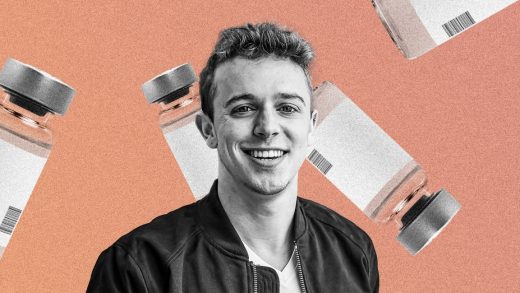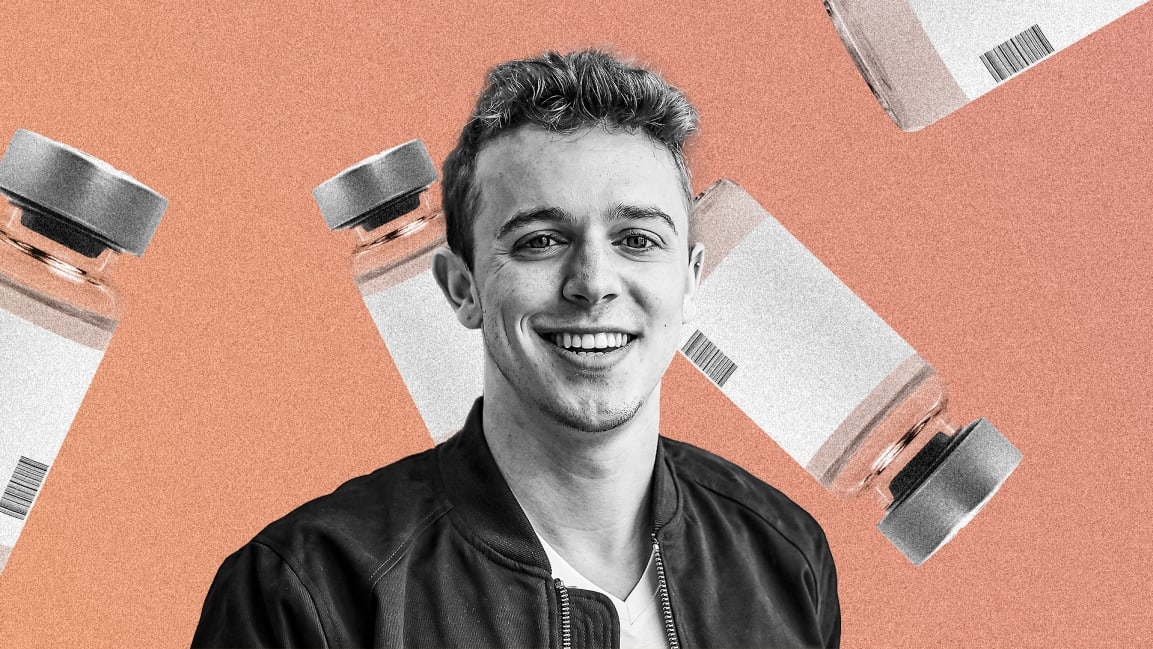“Truth-seeking” Ryan Breslow is throwing bombs on Twitter—and getting into pharmaceuticals
Sitting in a sunny room in his Miami home, Ryan Breslow, cofounder and executive chairman of Bolt, says he’s doing fantastically. In the last three months, Breslow has been on a Twitter-thread spree, calling out perceived detractors and, as he tells it, speaking the truth. These rants often focus on corruption among Silicon Valley’s most elite venture capitalists and how he thinks they wield power and money to keep little guys like him down. Some reports suggest that these tirades are costing him money. But Breslow, who is Zooming in with cofounder JR Rahn, says he’s not concerned.
“All I care about is truth-seeking and pushing the world forward, and that drives all of my businesses and things that I say,” he tells Fast Company.
It’s also what he says is the motivator behind his latest project, Love.
“We’re not interested in the short-term profit of a drug”
The goal with Breslow’s newfangled pharmaceuticals company is simple: to build a community of people who democratically elect nutraceuticals and other alternative medicines to run through clinical trials in order to find new modalities of treatment. The community will function through a decentralized autonomous organization. In addition to choosing something to test—like whether turmeric reduces inflammation—the DAO (decentralized autonomous organization) will be responsible for funding the clinical trial. Median costs for drug clinical trials are $19 million, though they can run into the hundreds of millions, according to data from a 2018 study. Rather than Love paying this cost outright, it will crowdfund through its community, which may be difficult.
Love is developing a software and logistics infrastructure through which it will run its community-chosen clinical trials. It will also commercialize products that show positive health impacts in its trials, though not every trial the company runs will lead to a commodity. “The community may want to run a study on holotropic breath work to understand en masse what that can achieve in the form of healing,” says Rahn, who previously led the psychedelic drug company MindMed and is now Love’s CEO.
To fund the company, Love will launch a crypto coin.
“Other blockchain-based projects have been able to raise large amounts of capital for, quite frankly, cartoons that dump throw-up on themselves,” says Rahn. “Love is actually focused on really doing something good for the world and allowing people to share in that upside.”
Exactly how Love will return value to its DAO constituents is still being worked out, says Breslow.
Rahn and Breslow met at Spotify cofounder Daniel Ek’s Brilliant Minds Conference in 2018 and bonded over their Miami origins. When Rahn left MindMed last year, the two started talking about a new approach to alternative medicines. Breslow had suffered through chronic spinal pain and, at one point, considered surgery before finding something else: “an energy healer, who helped me understand that my back pain was caused by trauma I had in my mind, helped me heal that energy.”
They reasoned that pharmaceutical companies would never fund a study on energy-healing or breath work, or other remedies that can’t be patented. What if, they thought, people could crowdsource and fund clinical trials and share the resulting data with the world? Wouldn’t that be new and revolutionary?
Breslow and Rahn are not the only two to stumble on the idea that perverse incentives in the pharmaceutical industry have kept needed drugs from reaching the market. As such, academics have for years toyed around with the idea of open-source medicine and even crowdsourced clinical trials or co-owned lab spaces. But Love is unique in using a speculative currency to fund research, and Rahn argues that such a structure will allow the company’s main function to be running clinical trials, with which he has some experience from his past company, MindMed.
“We’re not interested in the short-term profit of a drug. We’re interested in how we make Love into the largest market cap token so that we’re bigger than Big Pharma in terms of the balance sheet of this community, so we can direct that capital toward real healing and not just profits,” he says.
In the meantime, Rahn and Breslow are using their own personal capital, along with capital from an unnamed investor, to fund the company’s growth. Since that initial brainstorm, Love has hired pharmaceutical industry veterans, including head of legal Stacy Mcintosh, who most recently served as regulatory executive at Ridgeback Biotherapeutics; and chief medical officer Dr. Kevin Horgan, who has lead clinical research at Johnson & Johnson, General Electric Healthcare, and several other lesser known biopharmaceutical companies. Rahn says the company plans to launch a couple of clinical trials either this year or next in order to test its technological infrastructure before officially launching the community.
An order of more magnitude and hypocrisy
Breslow researched Bitcoin while he studying at Stanford University and remains bullish on the future of crypto. But the interest in creating a coin may also have to do with a desire to avoid typical modes of startup investment. “Venture capital is important, but it’s not the only source of capital in the world,” says Rahn. He and Breslow share a similar distrust of certain Silicon Valley investors, particularly Y Combinator and Sequoia Capital, both of which have been on the receiving end of Breslow’s Twitter tirades.
“I think we’ve talked a lot today about VCs and the hypocrisy of Silicon Valley, but Big Pharma and the pharmaceutical industry—I can tell you, there’s probably an order of [more] magnitude and hypocrisy than some of the stuff that goes on in Silicon Valley,” says Rahn.
Stripe and YCombinator, the Mob Bosses of Silicon Valley, a thread:
— Ryan Breslow (@theryanking) January 25, 2022
As far as The Mob goes, Sequoia is the Don.
As vicious as they come.
Their violence is done in silence.
Experts at pressure & power.
— Ryan Breslow (@theryanking) April 10, 2022
Both Breslow and Rahn have previously raised funding from venture capitalists for their other startups. Breslow’s company Bolt, where he serves as chairman, recently raised $355 million at a $14 billion valuation. When asked whether Breslow’s rants on Twitter will interfere with future funding for Love, both cofounders seem unfazed.
“Any investor that’s turned off by us, truth seeking, we don’t wanna have on our cap table,” says Breslow. “And the good investors [who] are backing us or backing [my] other companies, they know what I’m about.”
Update: a previous version of this article named Ashwath Rajan, a former Googler and cofounder of failed startup Stockwell (née Bodega), as a third cofounder, but he is no longer with the company.
Fast Company , Read Full Story
(60)



